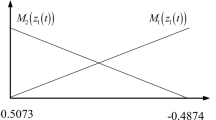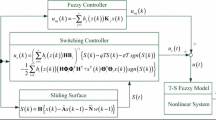Abstract
This paper studies the robust fuzzy controller design problem for the nonlinear ship fin stabilizing systems. By considering the perturbations, the nonlinear ship fin stabilizing system is represented by the perturbed Takagi–Sugeno fuzzy model. According to the perturbed Takagi–Sugeno fuzzy model, the parallel distributed compensation technique is used to design a model-based robust fuzzy controller. The purpose of the parallel distributed compensation fuzzy controller is to derive linear controllers such that each fuzzy rule of the Takagi–Sugeno fuzzy model can be compensated. In addition to the robust stability performance, the variance constraint and transient performance constraint are also considered in this paper. According to these performance constraints, the linear matrix inequality technique is employed to solve the sufficient conditions developed in this paper. At last, some simulations for the control of nonlinear ship fin stabilizing systems are made to show the usefulness and effectiveness of the proposed design method.










Similar content being viewed by others
References
Yin, J., Wang, N., Perakis, A.N.: A real-time sequential ship roll prediction scheme based on adaptive sliding data window. IEEE Trans. Syst. Man Cybern. Syst. 99, 1–11 (2018). https://doi.org/10.1109/tsmc.2017.2735995
Xiu, Z.H., Ren, G.: Fuzzy controller design and stability analysis for ship’s lift-feedback-fin stabilizer. In: Proceedings of the 2003 IEEE International Conference on Intelligent Transportation Systems, pp. 1692–1697 (2003)
Jin, H., Luo, Y., Wang, Z.: Design of sliding mode variable structure controller for electric servo system of fin stabilizer. In: Proceedings of the Sixth World Congress on Intelligent Control and Automation, vol. 1, pp. 2086–2090 (2006)
Perez, T., Goodwin, G.C.: Constrained predictive control of ship fin stabilizers to prevent dynamic stall. Control Eng. Pract. 16(4), 482–494 (2008)
Ghassemi, H., Dadmarzi, F.H., Ghadimi, P., Ommani, B.: Neural network-PID controller for roll fin stabilizer. Pol. Marit. Res. 17, 23–28 (2010)
Alarcin, F., Demirel, H., Su, M.E., Yurtseven, A.: Conventional PID and modified PID controller design for roll fin electro-hydraulic actuator. Acta Polytech. Hung. 11(3), 233–248 (2014)
Kula, K.S.: An overview of roll stabilizers and systems for their control. TransNav. Int. J. Mar. Navig. Saf. Sea Transp. 9(3), 405–414 (2015)
Chang, W.J., Hsu, F.L.: Mamdani and Takagi–Sugeno fuzzy controller design for ship fin stabilizing systems. In: Proceedings of the 12th International Conference on Fuzzy Systems and Knowledge Discovery, Zhangjiajie, China, August 15–17, pp. 376–381 (2015)
Tanaka, K., Wang, H.O.: Fuzzy Control Systems Design and Analysis: A Linear Matrix Inequality Approach. Wiley, New York (2001)
Ban, X., Gao, X.Z., Huang, X., Vasilakos, A.V.: Stability analysis of the simplest Takagi–Sugeno fuzzy control system using circle criterion. Inf. Sci. 177(20), 4387–4409 (2007)
Chang, W.J., Huang, W.H., Chang, W., Ku, C.C.: Robust fuzzy control for continuous perturbed time-delay affine Takagi–Sugeno Fuzzy models. Asian J. Control 13(6), 818–830 (2011)
Wang, W.J., Sun, C.H.: A relaxed stability criterion for T–S fuzzy discrete systems. IEEE Trans. Syst. Man Cybern. Part B 34(5), 2155–2158 (2004)
Chang, W.J., Ku, C.C., Chang, C.H.: PDC and Non-PDC fuzzy control with relaxed stability conditions for continuous-time multiplicative noised fuzzy systems. J. Frankl. Inst. Eng. Appl. Math. 349(8), 2664–2686 (2012)
Li, Y., Tong, S.: Adaptive fuzzy switched control design for uncertain nonholonomic systems with input nonsmooth constraint. Int. J. Syst. Sci. 47(14), 3436–3446 (2016)
Li, Y., Tong, S., Li, T.: Hybrid fuzzy adaptive output feedback control design for uncertain MIMO nonlinear systems with time-varying delays and input saturation. IEEE Trans. Fuzzy Syst. 24(4), 841–853 (2016)
Chang, X.H., Yang, G.H.: Nonfragile H ∞ filter design for T–S fuzzy systems in standard form. IEEE Trans. Ind. Electron. 61(7), 3448–3458 (2014)
Cervantes, J., Yu, W., Salazar, S.: Takagi–Sugeno dynamic neuro-fuzzy controller of uncertain nonlinear systems. IEEE Trans. Fuzzy Syst. 25(6), 1601–1615 (2017)
Chang, W.J., Hsu, F.L., Ku, C.C.: Complex performance control using sliding mode fuzzy approach for discrete-time nonlinear systems via T–S fuzzy model with bilinear consequent part. Int. J. Control Autom. Syst. 15(4), 1901–1915 (2017)
Chang, W.J., Qiao, H.Y., Ku, C.C.: Sliding mode fuzzy control for nonlinear stochastic systems subject to pole assignment and variance constraint. Inf. Sci. 432, 133–145 (2018)
Wang, Y., Shen, H., Karimi, H.R., Duan, D.: Dissipativity-based fuzzy integral sliding mode control of continuous-time T–S fuzzy systems. IEEE Trans. Fuzzy Syst. 26(3), 1164–1176 (2018)
Wang, Y., Gao, Y., Karimi, H.R., Shen, H., Fang, Z.: Sliding mode control of fuzzy singularly perturbed systems with application to electric circuit. Syst. Man Cybern. Syst, IEEE Trans (2018). https://doi.org/10.1109/TSMC.2017.2720968
Chang, W.J., Yang, C.T., Chen, P.H.: Robust fuzzy congestion control of TCP/AQM router via perturbed Takagi–Sugeno fuzzy models. Int. J. Fuzzy Syst. 15(2), 203–213 (2013)
Chang, W.J., Chang, Y.C., Ku, C.C.: Passive fuzzy control via fuzzy integral Lyapunov function for nonlinear ship drum-boiler systems. J. Dyn. Syst. Meas. Control 137(4), 041008 (2015)
Chang, W.J., Huang, B.J., Chen P.H.: Fuzzy stabilization for nonlinear discrete ship steering stochastic systems subject to state variance and passivity constraints. Math. Probl. Eng. 2014, Article ID 598618 (2014)
Hu, X., Du, J., Shi, J.: Adaptive fuzzy controller design for dynamic positioning system of vessels. Appl. Ocean Res. 53(1), 46–53 (2015)
Wang, N., Su, S.F., Yin, J., Zheng, Z., Er, M.J.: Global asymptotic model-free trajectory-independent tracking control of an uncertain marine vehicle: an adaptive universe-based fuzzy control approach. IEEE Trans. Fuzzy Syst. 26(3), 1613–1625 (2018)
Wang, N., Sun, J.C., Er, M.J.: Tracking-error-based universal adaptive fuzzy control for output tracking of nonlinear systems with completely unknown dynamics. IEEE Trans. Fuzzy Syst. 26(2), 869–883 (2018)
Ku, C.C., Huang, P.H., Chang, W.J.: Passive fuzzy controller design for nonlinear systems with multiplicative noises. J. Frankl. Inst. Eng. Appl. Math. 347(5), 732–750 (2010)
Ben Salah, R., Kahouli, O., Hadjabdallah, H.: A nonlinear Takagi–Sugeno fuzzy logic control for single machine power system. Int. J. Adv. Manuf. Technol. 354(5), 2295–2309 (2017)
Lin, C.M., Hsueh, C.S., Chen, C.H.: Robust adaptive backstepping control for a class of nonlinear systems using recurrent wavelet neural network. Neurocomputing 142, 372–382 (2014)
Qiao, H.Y., Chang, W.J., Ku, C.C.: Robust fuzzy based sliding mode control for uncertain discrete nonlinear systems for achieving performance requirements. Int. J. Fuzzy Syst. 20(1), 246–258 (2018)
Chang, W.J., Huang, B.Y.: Robust fuzzy control subject to state variance and passivity constraints for perturbed nonlinear systems with multiplicative noises. ISA Trans. 53(6), 1787–1795 (2014)
Zhong, Z., Zhu, Y., Yang, T.: Robust decentralized static output-feedback control design for large-scale nonlinear systems using Takagi–Sugeno fuzzy models. IEEE Access 4, 8250–8263 (2016)
Chang, W.J., Yeh, Y.L., Tsai, K.H.: Covariance control with observed-state feedback gains for continuous nonlinear systems using T–S fuzzy models. ISA Trans. 43(3), 389–398 (2004)
Dong, H.L., Wang, Z.D., Shen, B., Ding, D.R.: Variance-constrained H ∞ control for a class of nonlinear stochastic discrete time-varying systems: the event-triggered design. Automatica 72, 28–36 (2016)
Wang, F.G., Wang, H.M., Park, S.K.: Linear pole-placement anti-windup control for input saturation nonlinear system based on Takagi–Sugeno fuzzy model. Int. J. Control Autom. Syst. 14(6), 1599–1606 (2016)
Chang, C.M., Chang, W.J., Ku, C.C., Hsu, F.L.: Passive fuzzy control for lift feedback fin stabilizer systems of a ship via multiplicative noise based on fuzzy model. J. Mar. Sci. Technol. 26(2), 159–165 (2018)
Chilali, M., Gahinet, P.: H ∞ design with pole placement constraints: an LMI approach. IEEE Trans. Autom. Control 41(3), 358–367 (1996)
Nguang, S.K., Assawinchaichote, W.: H ∞ filtering for fuzzy dynamical systems with D stability constraints. IEEE Trans. Circuits Syst. I Fundam. Theory Appl. 50(11), 1503–1508 (2003)
Tian, E.G., Yue, D., Zhang, Y.J.: Delay-dependent robust H ∞ control for T–S fuzzy system with Interval time-varying delay. Fuzzy Set Syst. 160(12), 1708–1719 (2009)
Boyd, S., Ghaoui, L.E., Feron, E., Balakrishnan, V.: Linear Matrix Inequalities in System and Control Theory. SIAM, Philadelphia (1994)
Chang, W.J., Wu, S.M.: Covariance control for fuzzy-based nonlinear stochastic systems. Int. J. Fuzzy Syst. 5(4), 221–228 (2003)
Hong, S.K., Nam, Y.: Stable fuzzy control system design with pole-placement constraint: an LMI approach. Comput. Ind. 51(1), 1–11 (2003)
Sung, H.C., Park, J.B.: Robust fuzzy control for a hybrid magnetic bearings: the relaxed stabilization condition approach. Nonlinear Dyn. 85(4), 2487–2496 (2016)
Chen, J., Xu, S., Ma, Q.: Relaxed stability conditions for discrete-time T–S fuzzy systems via double homogeneous polynomial approach. Int. J. Fuzzy Syst. 20(3), 741–749 (2018)
Acknowledgement
The authors would like to express their sincere gratitude to the anonymous reviewers who gave us many constructive comments and suggestions. This work was supported by the Ministry of Science and Technology of the Republic of China under Contract MOST107-2221-E-019-050.
Author information
Authors and Affiliations
Corresponding author
Rights and permissions
About this article
Cite this article
Chang, CM., Chang, WJ. Robust Fuzzy Control with Transient and Steady-State Performance Constraints for Ship Fin Stabilizing Systems. Int. J. Fuzzy Syst. 21, 518–531 (2019). https://doi.org/10.1007/s40815-018-0555-7
Received:
Revised:
Accepted:
Published:
Issue Date:
DOI: https://doi.org/10.1007/s40815-018-0555-7




